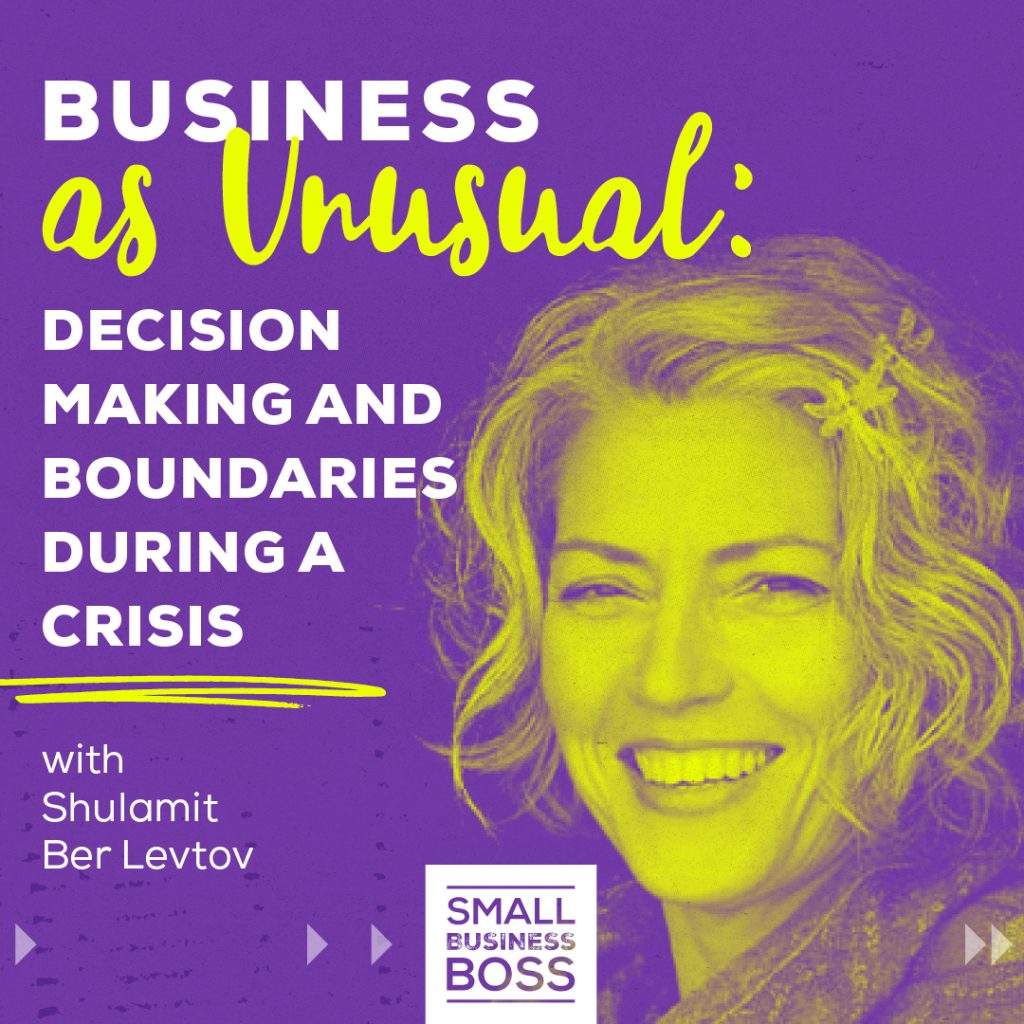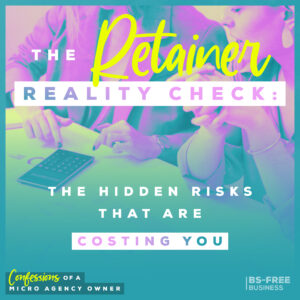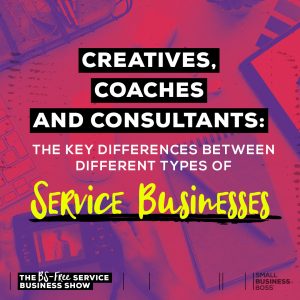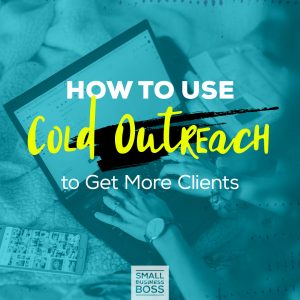
Search the site:
Episode 211: Business as Unusual: Decision Making and Boundaries During a Crisis (With Shulamit Ber Levtov)
When things are unusual, it’s all too easy for our decision making to falter and for our boundaries to be shaky. In this episode, guest Shulamit Ber Levtov walks us through how to deal with our fear in this unique time we’re living through.
The last few weeks have been a rollercoaster of emotions for most of us as we process what’s happening and deal with our new reality. As a business owner, you may be feeling a mix of fear, sadness, anxiety and even faith or hope. I know I’ve felt all of those things and more, sometimes all in the same day. Along the way I’ve noticed decisions that would normally be easy to make becoming harder and in one case I ignored some major red flags.
I know I’m not alone in any of that, so I wanted to invite Shulamit Ber Levtov to join us on the show to talk about decision making, boundaries, fear and more amid this pandemic.
A lot of us are struggling during this time of “business as unusual”, especially with handling the fear we’re experiencing and how that impacts our business. How can we still move ahead and make solid decisions when we’re fearful?
- The first step is to be aware of what’s happening with you. That’s you looking around and going “Okay, that’s right, I’m feeling scared.”. The second step is opening the door and saying “Oh yeah, I’m scared. And of course I would be because look at this mess we’re living through. Who wouldn’t be in the middle of this, right?”. Acknowledge the fear is valid.
- Those two moves help regulate your nervous system. Technically speaking, they calm the amygdala. The amygdala is the emotion center and when the emotion center gets activated, we flip our lids, which means the prefrontal cortex, which is where all our higher level executive functioning kind of resides. It literally goes offline, stops communicating with the rest of the brain.
- By calming the amygdala it allows your lid to come back on line and for you to think straight. How you calm the amygdala is by noticing what’s happening, naming it and then saying “No wonder I’m scared.”.
Many people’s immediate response was this fearful, frenzied activity that’s clearly fight/flight. How can we get ourselves out of the fight/flight response so we can do what we need to do as business owners?
- Because of past traumas or whatever, we’re very good at cutting to the worst case scenario and the fear we’re feeling can mess with rational thinking.
- When we start dwelling on worst case scenarios, we need to bring ourselves back to reality by acknowledging we’re worrying about something that’s five thousand steps down the road. You need to soothe and calm yourself so you can think using your higher powers, your higher your executive functioning, to see what’s true and then figure out what you can do about it.
- The higher level of addressing this fight or flight response (that we quite naturally have) is to pay attention to the signals of danger that you’re taking in or that you’re giving to yourself. Then you work on balancing them with signals of reassurance and comfort. This really requires you to up your self care game, but in a different way.
- When you’re working, make sure you GET UP regularly. Do jumping jacks, stretch and breathe, walk around the office, have a cup of tea, look out the window for 15 minutes.
- It would be really helpful to play a happy song and just wiggle a little bit because that will affect more than just the body. You also get the emotions. Doing that kind of thing regularly helps balance the fear messages with the reminder that you’re alive right now and you’re actually doing okay.
How do we manage expectations and set clear boundaries right now when we’re likely feeling like we need to serve everyone and do everything we can to survive?
- Our desire to overrun our boundaries comes from fear. Either that we won’t be okay or that they won’t be okay. Once you’re able to care for your fear, my belief is then that you would be able to reflect on what’s truly helpful for you and what’s truly helpful for them and make a choice from that place rather than the fear place.
- Life is a long game. Business is a long game. Quite possibly this isolation could be a long game and so sustainability really matters and I invite for a reflection. Once you’ve cared for the fear and you’ve come to a spot where you can do some problem solving, the barometer against which you measure your choices would be sustainability.
- Will this make it possible for me to be here six weeks, two months, six months, two years from now? Not necessarily being here in isolation but being here in business and the world. If the way you want to be in the world is X, then you need to ask yourself if what you’re doing supports that and is sustainable.
It’s clear at this point this is going to be a marathon, not a sprint, and no one really knows what a post-pandemic world looks like. What can we do to help manage our reaction to that uncertainty?
- Security is a game we play with ourselves. We think things are going to go like they’ve always gone and that’s how we cope. So when we come up against uncertainty like what’s happening now, it’s showing us the truly uncertain nature of all life.
- What we’re called to do right now is learn a huge, universal lesson about our reality — that it actually isn’t permanent and never was and never will be. It’s terrifying to encounter a world that you thought was one way and suddenly is no longer the way it was and you don’t know what it holds anymore. It can feel like there’s no center for you.
- To cope with those feelings: scream about it, cry about it, talk to somebody about it, pray about it if that’s your jam or sing or walk about it in nature.
- Giving yourself an opportunity to let your feelings out is necessary. Because if you don’t, they’ll get stuck in you and then you’re going to end up in trouble.
- Breaking things into bite-size pieces because you don’t have to focus on what you don’t know. Instead of business planning for the quarter, you can plan for a week. This activity is another thing you can do to soothe and calm yourself as it helps you feel more in control of the situation. Even if you’re just planning a day at a time.
- Making a list of what you CAN and CANNOT control and putting the list of things you can’t control on the wall can act as a reminder that when you start to want to do stuff about that, that you’re like, “Oh yeah, wait a minute, that’s on my list. Let me look at the list of things I can control.”. Being able to do something is a way to mobilize and curb some feelings of powerlessness in the face of a threat or danger is an aspect of trauma.
- Look for reassurance in the natural world. There’s a poem called The Wild Geese by Mary Oliver where she talks about the wild geese flying home, calling out to one another, showing us our place in the family of things. I take great faith in the fact that the sun still rises every morning and the leaves are still going to come on the trees. The natural world continues. Life continues, babies are born, people die. All this is still happening in the midst of this global pandemic. There is something greatly reassuring about that knowledge that life and time continue no matter what.
Any final thoughts for our listeners or readers?
- As humans we’re resilient and as entrepreneurs we’re uniquely placed to withstand this because we understand risk and have lived with risk the entirety of our entrepreneurial careers. Entrepreneurs are creative. We know how to scramble. We know how to make lemons out of lemonade. We know how to pivot. We got this. It’ll be hard and I’m not saying it’s a picnic, but we got this.
Shuli’s Bio
Shulamit Ber Levtov is a psychotherapist and social worker who helps business women and busy women recover from stress and anxiety so they can relax, feel better about themselves and respond effectively when the crap hits the fan. She also works with women and men who have experienced childhood sexual abuse, sexual assault or domestic violence, supporting them to recover from the effects of trauma and enjoy life more.
Shulamit holds a Masters in Counselling and Spirituality, and is a Certified Clinical Trauma Professional with the International Association of Trauma Professionals, a non-profit organization that specializes in the certification of trauma providers. She’s certified as a trainer in both Nonviolent Communication and Focusing (the third in the world to hold this dual certification), and is a registered social worker. She’s a certified Kripalu Yoga teacher, with formal studies in Yoga therapy, as well as Judaism, Christianity, Buddhism, Wicca, Paganism, and Women’s Spirituality.
Shulamit offers in-person psychotherapy and counselling in Kemptville, Ontario as well as services by phone and secure video.
Links for this episode:

I’m Maggie Patterson (she/her), and services businesses are my business.
I have 20+ years of experience with client services, am a consultant for agency owners, creatives, and consultants, and vocal advocate for humane business practices rooted in empathy, respect, and trust.
Read or Listen to the Latest
For Solo Business Owners

Growing a solo service business is tough.
It’s even harder when you’re bombarded with BS advice that steers you away from your values and why you started your business in the first place.
This is the podcast for solo creatives and consultants who want to remain as a team of one and have zero interest in the hustle and grind of typical business teachings.
Subscribe now and never miss an episode.
For Micro Agency Owners
Most podcasts for agency owners obsess over revenue growth as the ultimate success metric.

But here’s the truth: not everyone wants to make millions. Your goal might be to build a sustainable business that lets you have a life and doesn’t run you into the ground.
Join me as I spill my shameless confessions and share everything I’ve learned about building a micro agency that skips the BS of tired and typical agency teachings.
Follow Now on All Major Podcast Platforms








